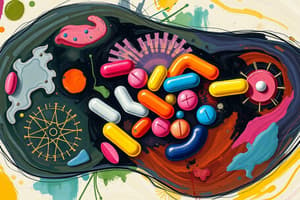Podcast
Questions and Answers
What is the primary mechanism of action of statins?
What is the primary mechanism of action of statins?
- Increase in triglyceride synthesis by the liver
- Inhibition of HMG CoA reductase (correct)
- Inhibition of cholesterol absorption in the intestines
- Activation of LDL receptors in peripheral tissues
Which statement about the pharmacokinetics of statins is true?
Which statement about the pharmacokinetics of statins is true?
- Some statins have a longer duration of action and can be taken at any time. (correct)
- All statins can be administered at any time of the day.
- They should always be taken on an empty stomach.
- Food reduces the absorption of statins.
Which of the following statins is not metabolized by CYP3A4?
Which of the following statins is not metabolized by CYP3A4?
- Simvastatin
- Atorvastatin
- Rosuvastatin
- Pravastatin (correct)
What is a common side effect associated with statin use?
What is a common side effect associated with statin use?
Which statin is known to have a higher CNS penetration?
Which statin is known to have a higher CNS penetration?
What is one of the pleiotropic effects of statins?
What is one of the pleiotropic effects of statins?
Which of the following statements about prodrugs is accurate in relation to statins?
Which of the following statements about prodrugs is accurate in relation to statins?
What should be monitored to assess for muscle damage in patients taking statins?
What should be monitored to assess for muscle damage in patients taking statins?
Flashcards
Statins' MOA
Statins' MOA
Statins inhibit HMG CoA reductase, decreasing cholesterol synthesis by the liver. This triggers LDL receptor upregulation, leading to increased cholesterol uptake from the blood, lowering LDL levels.
Statin Pharmacokinetics
Statin Pharmacokinetics
Most statins are taken after meals, with HMG CoA activity peaking at night. Some have long durations and can be taken anytime. Food increases absorption. Metabolism is primarily via CYP3A4, except Pravastatin. CYP3A4 inhibitor co-administration can lead to increased toxicity.
Common Statins
Common Statins
Commonly used statins include Atorvastatin, Rosuvastatin, Pravastatin, Simvastatin, Fluvastatin, and Cerivastatin (while it ends in '-statin', it's not an HMG-CoA inhibitor).
Statin Toxicity
Statin Toxicity
Signup and view all the flashcards
Statin Monitoring
Statin Monitoring
Signup and view all the flashcards
Pleiotropic Effects
Pleiotropic Effects
Signup and view all the flashcards
Simvastatin & Lovastatin
Simvastatin & Lovastatin
Signup and view all the flashcards
What is HMG CoA reductase?
What is HMG CoA reductase?
Signup and view all the flashcards
Study Notes
Anti-Dyslipidemic Drugs: Statins
- Statins are drugs used to lower cholesterol levels.
- They work by inhibiting the enzyme HMG-CoA reductase.
- This reduces cholesterol production in the liver.
- LDL receptors are upregulated, taking up cholesterol from the blood.
- Statins maximize LDL cholesterol lowering.
- Common statins include Atorvastatin, Rosuvastatin, Pravastatin, Simvastatin, Fluvastatin, and Cerivastatin.
- Some statins (e.g., Atorvastatin, Rosuvastatin) can be taken at any time of the day, while others (e.g., Pravastatin) are best taken after meals.
- Statins are primarily metabolized by CYP3A4, except Pravastatin.
- Combining statins with CYP3A4 inhibitors can lead to increased toxicity.
- Statin toxicity can manifest as myopathy (muscle damage), diabetes mellitus, and hepatotoxicity.
- Monitoring creatinine phosphokinase (CPK) levels is important when starting statins to assess for muscle damage.
- Food increases statin absorption, so they are often taken with meals except for some types.
- Some drugs ending in "-statin," aren't HMG-CoA inhibitors, such as Cilastatin, Pentostatin, and Somatostatin, used with other medications.
- Cilastatin is given with Imipenem to block its breakdown, Pentostatin inhibits adenosine deaminase, and Somatostatin is a hormone.
Pleiotropic Effects
- Pleiotropic effects are additional benefits of statins beyond their cholesterol-lowering properties.
- These effects often include plaque stabilization, improved endothelial function, reduced inflammation, less oxidative stress, and lower risk of thrombosis.
Studying That Suits You
Use AI to generate personalized quizzes and flashcards to suit your learning preferences.


